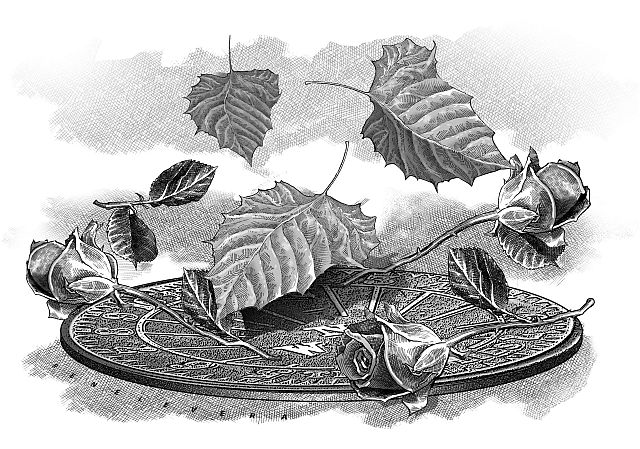
Like a protagonist in a novel by John Cheever, I mark the year’s passing with the changes in the liturgy. Hence, the feast of St. Michael the Archangel alerts me to the arrival of October, with the month’s entrance coinciding with the feast of St. Thérèse of Lisieux, popularly known as the Little Flower. Three days after that comes the feast of St. Francis of Assisi, my town’s patron saint.
September ended with a night of heavy rain, which did not surprise me because the reports intimated the emergence out in the Pacific of a weather disturbance, the seed of typhoons.
Because of its distance, this gave me no anxiety as yet. In fact, the rain’s constant tapping on the roof and balcony only deepened my sleep. I had gone to bed secure in the thought that nothing untoward would happen, and in the morning I would see nothing worse than the litter of leaves on the patio, the result of the downpour’s repeated pounding on the yellow bells.
The thought of leaves reminds me of a poem by Rainer Maria Rilke. Its original German title is “Herbsttag,” which, in his English version, Robert Bly translates as “October Day.”
Oh Lord, it’s time, it’s time. It was a great summer.
Lay your shadow now on the sundials,
and on the open fields let the winds go!
Give the tardy fruits the command to fill;
give them two more Mediterranean days,
drive them on into their greatness, and press
the final sweetness into the heavy wine.
Whoever has no house by now will not build.
Whoever is alone now, will remain alone,
will wait up, read, write long letters,
and walk along sidewalks under large trees,
not going home, as the leaves fall and blow away.
The poem assumes the form of a prayer, asking the Lord to let the cold winds of autumn begin blowing, it being the end of a marvelous summer but at the same time allowing a few more days for the conclusion of the harvest, especially of the late-ripening crops.
Then the poem shifts gear and speaks of those at the end of summer still without homes and who are alone, and, finding it too late to make changes, will remain vagrant and without a companion.
We could speculate as to whom Rilke is alluding when mentioning the homeless and lonely — is this Rilke himself, whom W. H. Auden described as “the Santa Claus of loneliness?” Incidentally, I find a deeper, a spiritual dimension in the poem, especially when I view it through the prism of the Gospel of Luke, in particular the parable that Jesus told of the unprofitable servant.
In answer to the apostles’ plea for the Lord to increase their faith, Jesus said, “If you have faith the size of a mustard seed, you would say to this mulberry tree, ‘Be uprooted and planted in the sea,’ and it would obey you.”
Jesus continued, “Who among you would say to your servant who has just come in from plowing or tending sheep in the field, ‘Come here immediately and take your place at table’? Would he not rather say to him, ‘Prepare something for me to eat. Put on your apron and wait on me while I eat and drink. You may eat and drink when I am finished’? Is he grateful to that servant because he did what was commanded? So should it be with you. When you have done all you have been commanded, say, ‘We are unprofitable servants; we have done what we were obliged to do.’”
I think that, when Jesus told the apostles to have a faith the size of a mustard seed, more than implying the power of even a faith of that size, he wanted them to treat their faith as a seed, make it grow and care for it until it becomes a big tree. The planting and nurturing of the mustard seed should be done in the height of summer, while there is time. Because when the cold months arrive, it might be too late for cultivation.
In the end, only those who, like St. Thérèse and St. Francis and the rest of the saints, took care of the seed of faith and brought it to maturation, can say, when the harvest season comes, “Lord, it is time, it is time for your visitation.” And they need not do anything because as good servants, they accomplished only what was required of them.
The time is ripe for God to gather the harvest and to send St. Michael and his angels to sweep across the land like the autumn winds.
But those who were unfaithful, who ignored and neglected to nurture the mustard seed, as the end times approach, will continue to be faithless and find themselves endlessly walking, and without a home.
Disclaimer: The comments uploaded on this site do not necessarily represent or reflect the views of management and owner of Cebudailynews. We reserve the right to exclude comments that we deem to be inconsistent with our editorial standards.




